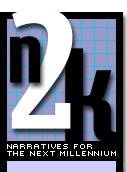

|
Living in the Middle Ages
On the one hand we find a fairly perfect correspondence between two ages that, in different ways but with identical educational utopias and with equal ideological camouflage of their paternalistic aim to control minds, try to bridge the gap between learned culture and popular culture thorugh visual communication. In both periods the select élite debates written texts with alphabetic mentality, but then translates into images the essential data or knowledge and the fundamental structure of the ruling ideology. The M.A. are the civilization of vision, where the cathedral is the great book in stone, and is indeed the advertisement, the TV screen, the mystic comic strip that must narrate and explain everything...Alongside this massive popular-culture enterprise there proceeds the work of composition and collage that learned culture is carrying our on the floatsam of past culture...Nothing more closely resembles a monastery (lost in the countryside, walled, flanked by alien, barbarian hordes, inhabited by monks who have nothing to do with the world and devote themselves to their private researches) than an American university campus... But it is doubtful that these monastic centers will have the task of recording, preserving, and transmitting the wealth of past culture, perhaps through complicated electronic devices that will recall it a piece at the time, stimulating its reconstruction without ever revealing its secrets fully. The other M.A. produced, at the end, the Renaissance, which took delight in archeology; but actually the M.A. did not carry out any systematic preservation; rather it performed a heedless destruction and a disordered preservation: it lost essential manuscripts and saved others that were quite negligible; it scratched away marvelous poems to write riddles or prayers in their place, it falsified sacred texts, interpolating other passages and, in doing so, wrote "its own" books...Our own M.A., it has been said, will be an age of "permanent transition" for which new methods of adjustement will have to be employed. The problem will not so much be that of preserving the past scientifically as of developing hypothesis for the exploitation of disorder...This is how medieval man invented the university, with the same carefree attitude that the vagabond clerks today assume in destrying it, and perhaps transforming it. The M.A. preserved in this way the heritage of the past but not through hibernation, rather through a constant retranslation and reuse; it was an immense work of bricolage, balanced among nostalgia, hope and despair... (Umberto Eco, "Living in the New Middle Ages", Travels in Hyper-reality, 73-85) |
 ...a model of the M.A. can help us understand what is happening
in our own day...
...a model of the M.A. can help us understand what is happening
in our own day...